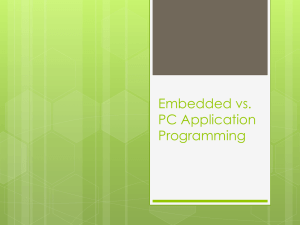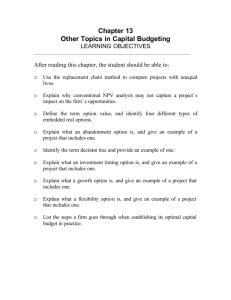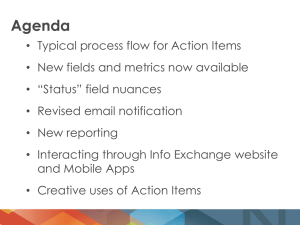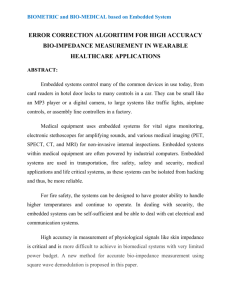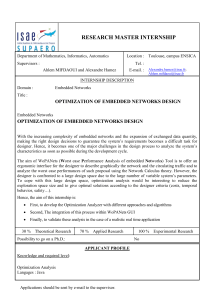PDF version - College of Computer Science & Engineering
advertisement
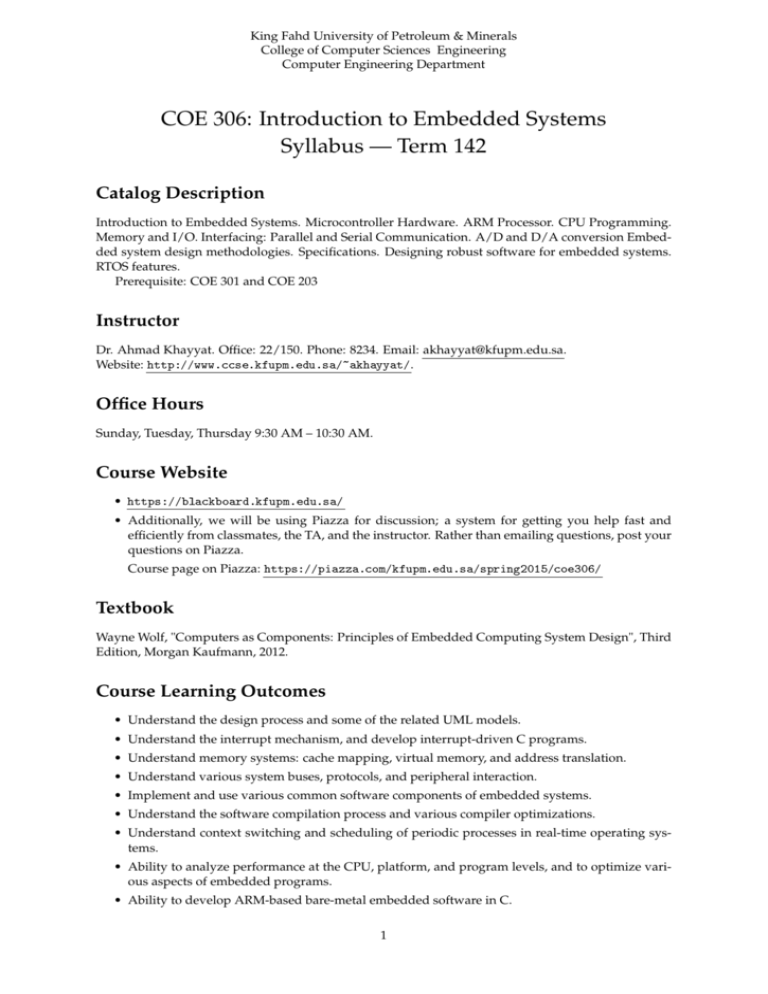
King Fahd University of Petroleum & Minerals College of Computer Sciences Engineering Computer Engineering Department COE 306: Introduction to Embedded Systems Syllabus — Term 142 Catalog Description Introduction to Embedded Systems. Microcontroller Hardware. ARM Processor. CPU Programming. Memory and I/O. Interfacing: Parallel and Serial Communication. A/D and D/A conversion Embedded system design methodologies. Specifications. Designing robust software for embedded systems. RTOS features. Prerequisite: COE 301 and COE 203 Instructor Dr. Ahmad Khayyat. Office: 22/150. Phone: 8234. Email: akhayyat@kfupm.edu.sa. Website: http://www.ccse.kfupm.edu.sa/~akhayyat/. Office Hours Sunday, Tuesday, Thursday 9:30 AM – 10:30 AM. Course Website • https://blackboard.kfupm.edu.sa/ • Additionally, we will be using Piazza for discussion; a system for getting you help fast and efficiently from classmates, the TA, and the instructor. Rather than emailing questions, post your questions on Piazza. Course page on Piazza: https://piazza.com/kfupm.edu.sa/spring2015/coe306/ Textbook Wayne Wolf, "Computers as Components: Principles of Embedded Computing System Design", Third Edition, Morgan Kaufmann, 2012. Course Learning Outcomes • Understand the design process and some of the related UML models. • Understand the interrupt mechanism, and develop interrupt-driven C programs. • Understand memory systems: cache mapping, virtual memory, and address translation. • Understand various system buses, protocols, and peripheral interaction. • Implement and use various common software components of embedded systems. • Understand the software compilation process and various compiler optimizations. • Understand context switching and scheduling of periodic processes in real-time operating systems. • Ability to analyze performance at the CPU, platform, and program levels, and to optimize various aspects of embedded programs. • Ability to develop ARM-based bare-metal embedded software in C. 1 Grading Policy Assignments Quizzes Exam I Exam II Final Exam Lab and project 10% 10% 15% 15% 25% 25% Monday March 9, 2015, 6 PM Sunday April 19, 2015, 6:30 PM Tuesday May 26, 2015, 8 AM • Attendance is required. For each three missed classes, a penalty of 0.5 points will be deducted. The tenth unexcused absence results in a DN grade. • Late assignments penalty: 20% per day. • Cheating in one assignment or quiz will result in a zero in all assignments or quizzes. Any identical solutions are considered cheating. • No makeup will be made for missed quizzes or exams. Course Topics • Introduction to Embedded Systems Introduction to embedded systems; requirements analysis; specifications; design methodologies overview. • Microcontroller Organization Computer architectures, ARM organization, ARM instruction set, data operations, control flow, PIC, TI DSPs. • CPUs I/O and memory mapping, addressing modes, interrupts and traps, caches, co-processors, memory management unit, virtual memory, address translation, CPU performance, pipelining. • Embedded Platforms Hardware and software components of embedded platforms, bus protocols, DMA, system bus configurations, the AMBA and AHB buses, memory devices, example embedded platforms, bandwidth, bus and memory performance, performance bottleneck. • Program Design and Analysis State machines, circular buffers, queues, models of programs, the compilation process, program performance and optimization, power analysis, program size analysis, validation and testing. • Processes and Operating Systems Tasks and processes, process timing requirements, real-time operating systems, preemptive execution, context switching, scheduling processes, priority scheduling, inter-process communication, shared-memory systems, message passing. • Networks and Multiprocessors Multiprocessor systems, distributed embedded systems, CAN bus, I2C bus, multiprocessor system-on-chip (MPSoC), accelerators. Lab Topics • Development platform • Embedded development APIs • General-purpose input/output (GPIO) 2 • Interrupts • Hardware timers • Analog input • Pulse-width modulation • Serial communication 3
